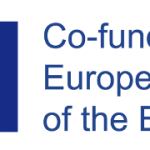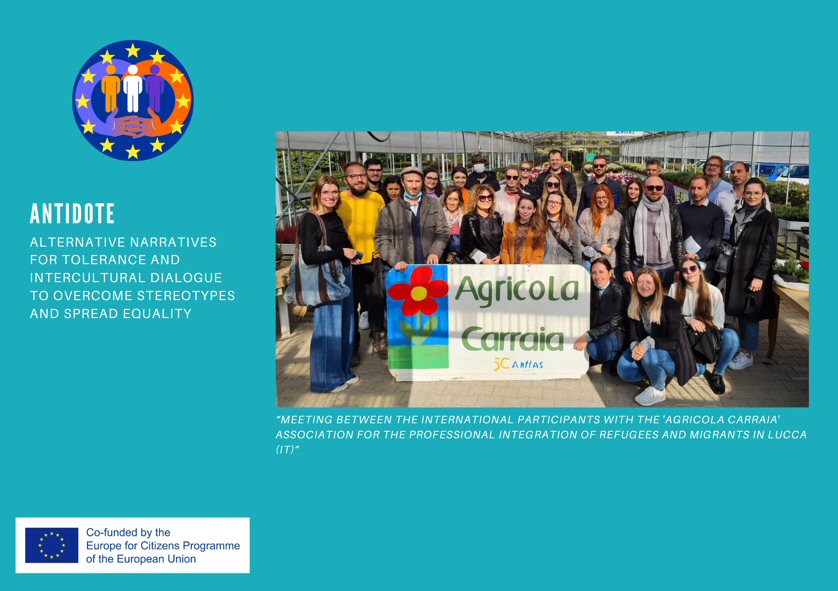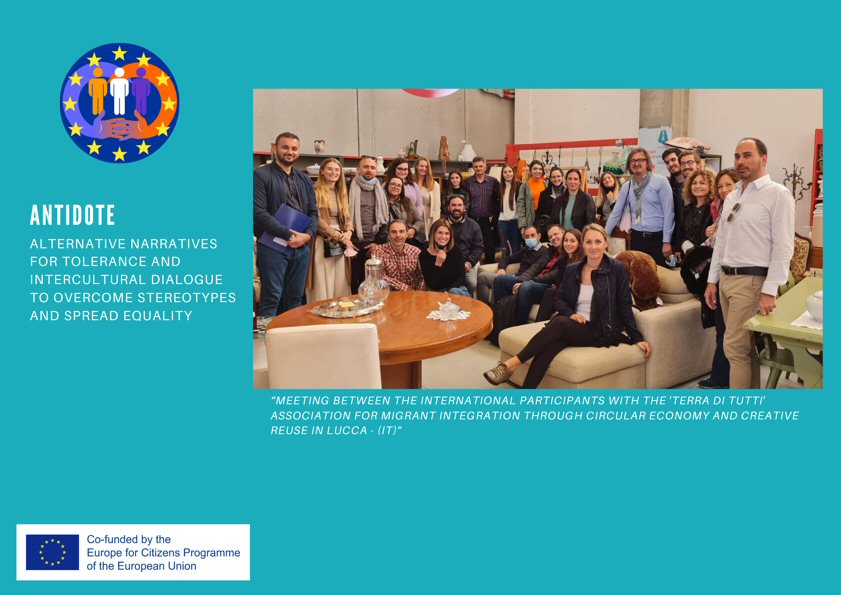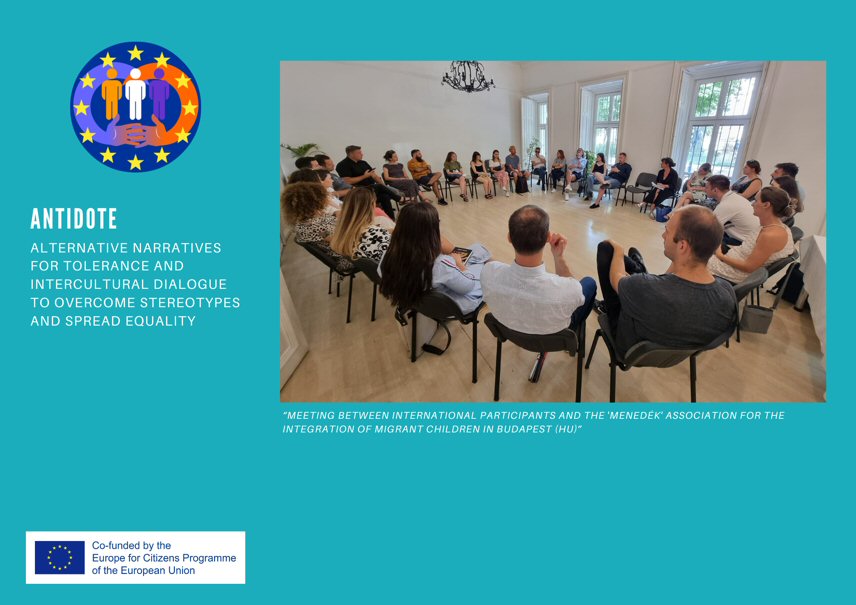Alternative narratives for tolerance and intercultural dialogue to overcome stereotypes and spread equality
Project abstract
In today’s Europe, the extremist or populist movements regularly stigmatize migrants and minorities in their political discourse, amalgamating distinct concepts as well as crisis and migration or terrorism and migration, in order to polarize public opinion. This trend stands in stark contrast to the EU values and aims dedicated to the spread of inter-cultural dialogue by bringing together people of different cultures by giving them the opportunity to participate in common activities. The Europe is experiencing the most significant influxes of migrants in its history. The migration brings diversity and the inter-cultural dialogue is an effective antidote to the spreading of the stereotypes and polarization of the public opinion. These backgrounds create a breeding ground for intolerance and discrimination. It is necessary to act in order to promote diversity, tolerance and the respect of EU values. Against this, ANTIDOTE’s mission is to take action against regular stigmatization of the migrants and minorities, answering to the need to establish a common ground between different cultures and communities by promoting understanding and interaction. Our Network, consisting of local authorities, citizens and recognized NGO’s committed to supporting integration, puts great emphasis on education as the antidote to polarization of the public opinion with the aim to teach citizens the value of tolerance with ambition to actively foster the intercultural dialogue so help in avoiding conflict and the marginalization of migrants and minorities. ANTIDOTE project, with its powerful alternative narratives, will encourage inter-cultural dialogue between EU citizens and migrants, will help to overcome stereotypes by de-constructing processes of stigmatization. It will raise awareness on the richness of the cultural and linguistic environment in EU and promote tolerance, thereby contributing to the development of a respectful, dynamic and multifaceted EU identity. Focusing on the detection and exposure of trending narratives, disinformation channels and disinformation techniques, the ambitious aim of this project is to try to channel criticism of the EU into positive driver for the European integration in the long run and to help the EU to come closer to its citizen and to increase their resilience.

Work Programme
The project included five international events as follow:
- 1st Lucca (Italy): Kick-off meeting
- 2nd Bucharest (Romania): International training course
- 3rd Prishtina (Kosovo): Public debates, international conference
- 4th Gdansk (Poland): Open debates, international conference
- 5th Budapest (Hungary): Final Conference, presentation of results
Five events have been carried out within this project:
Event 1
Participation: The event involved 76 citizens from 13 countries, including: 1 from the city Sarajevo (Bosnia &Herzegovina), 53 from the city Lucca (Italy), 1 from the city Budapest (Hungary), 3 from the city Bucharest (Romania), 2 from the city Lezhe (Albania), 1 from the city Pelplin (Poland), 2 from the city Paredes (Portugal), 4 from the city of Brussels (Belgium), 2 from the city Pristina (Kosovo), 1 from the city Strovolos (Cyprus), 1 from the city Novo Mesto (Slovenia), 2 from the city Rijeka (Croatia), 3 from the city Breclav (Czech Republic)
Location / Dates: The event took place in Capannori – Lucca (Italy), from 18/10/2021 to 21/10/2021
Short description: The 1st international meeting (kick-off meeting), dealing with the way Europe’s towns and regions could move towards more diverse, equal, and inclusive societies, has been hosted and organized in Italy. It was a significant event that drew participants from across the continent. Hosted and meticulously organized in Italy, this gathering marked the beginning of a collaborative journey aimed at addressing some of the pressing challenges Europe faces today. At the heart of these discussions was a vision of creating more diverse, equal, and inclusive societies and a more inclusive labor market for migrants, and concrete solutions for better cooperation at the local level tackling discrimination and promoting diversity at the workplace. The program included auxiliary and complementary activities, among which the meeting between the international participants with the ‘Terra di Tutti’ Association for Migrant Integration through Circular Economy and Creative Reuse, and with the ‘Agricola Carrara’ Association for the Professional Integration of Refugees and Migrants.

Event 2
Participation: The event involved 76 citizens from 14 countries, including: 2 from the city Sarajevo (Bosnia & Herzegovina), 3 from the city Lucca (Italy), 2 from the city Budapest (Hungary), 52 from the city Bucharest (Romania), 1 from the city Lezhe (Albania), 1 from the city of Brussels (Belgium), 2 from the city Demir Kapija (Republic of North Macedonia), 2 from the city Pelplin (Poland), 1 from the city Paredes (Portugal), 2 from the city Pristina (Kosovo), 2 from the city Strovolos (Cyprus), 2 from the city Novo Mesto (Slovenia), 1 from the city Rijeka (Croatia), 3 from the city Breclav (Czech Republic)
Location / Dates: The event took place in Bucharest (Romania), from 16/05/2022 to 19/05/2022.
Short description: The 2nd international meeting and the two days training course, the participants were engaged in group discussions and labs focusing on resilience-building, counter-narrative methods, and understanding various narrative types. Workshops emphasized the importance of creating a safe space for intercultural interaction. They explored tactics like humor and sarcasm to counter extremist narratives. Training sessions addressed the key components of effective facilitation for positive, strategic and alternative narratives but also ethical and counter narratives.
Event 3
Participation: The event involved 76 citizens from 14 countries, including: 1 from the city Sarajevo (Bosnia & Herzegovina), 1 from the city Lucca (Italy), 2 from the city Budapest (Hungary), 2 from the city Bucharest (Romania), 5 from the city Lezhe (Albania), 3 from the city of Brussels (Belgium), 1 from the city Wien (Austria), 1 from the city Berlin (Germany), 1 from the city Paredes (Portugal), 53 from the city Pristina (Kosovo),1 from the city Strovolos (Cyprus), 1 from the city Novo Mesto (Slovenia), 2 from the city Rijeka (Croatia), 2 from the city Breclav (Czech Republic).
Location / Dates: The event took place in Pristina – (Kosovo), from 19/10/2022 to 22/10/2022
Short description: the 3rd international meeting in Pristina, Kosovo, was marked by discussions and conferences centered on the importance of intercultural dialogue for fostering respect and active citizenship, understanding EU migration processes, analyzing stigmatization and local polarization patterns, addressing xenophobia due to migration/refugees, and examining EU-level migration challenges with varying national outcomes. Moreover, the discussion addressed key solutions and the development of pilot projects aimed at overcoming stereotypes about immigrants.

Event 4
Participation: The event involved 77 citizens from 13 countries, including: 2 from the city Sarajevo (Bosnia & Herzegovina), 4 from the city Lucca (Italy), 1 from the city Budapest (Hungary), 2 from the city Bucharest (Romania), 1 from the city Demir Kapija (Republic of North Macedonia), 4 from the city of Brussels (Belgium), 53 from the city Pelplin (Poland), 4 from the city Pristina (Kosovo), 1 from the city Berlin (Germany), 1 from the city Strovolos (Cyprus), 1 from the city Novo Mesto (Slovenia), 1 from the city Rijeka (Croatia), 2 from the city Breclav (Czech Republic).
Location / Dates: The event took place in Gdansk (Poland), from 22/05/2023 to 25/05/2023.
Short description: the 4th international meeting project held in Gdańsk, May 2023, focused on social Innovation for refugee inclusion and the role of community-based organization in building inter-cultural dialogue. Labs for designing the training manual were implemented. Secondary activities included visiting the WWII Museum and the Solidarity Center. The participants also had a discussion with former Polish President Lech Wałęsa about his contributions to peace and democracy.
Event 5
Participation: The event involved 89 citizens from 13 countries, including: 3 from the city Sarajevo (Bosnia & Herzegovina), 2 from Lucca (Italy), 62 from the city Budapest (Hungary), 1 from Bucharest (Romania), 3 from the city Lezhe (Albania), 3 from the city of Brussels (Belgium), 1 from the city Demir Kapija (Republic of North Macedonia), 2 from the city Pelplin (Poland), 1 from the city Strovolos (Cyprus), 4 from the city Pristina (Kosovo), 2 from the city Novo Mesto (Slovenia), 1 from the city Rijeka (Croatia), 4 from the city Breclav (Czech Republic).
Location / Dates: The event took place in Budapest (Hungary), from 17/07/2023 to 20/07/2023.
Short description: The 5th International Project Meeting was held in Budapest, Hungary, attracting a diverse group of attendees from various European countries. The gathering served as a platform for robust discussions and collaborative brainstorming sessions. One of the standout sessions focused on “Reactivating European Urban Citizenship: A Network of Inclusive Towns.” This topic delved into the ways European cities can rekindle a sense of belonging among their residents. Presenters shared case studies of towns that have successfully fostered inclusivity, with initiatives aimed at bridging gaps between long-term residents and newcomers. The manual for training activities for social-youth operators to build a counter-narrative on the migration phenomenon has been presented. As a peripheral activity, a visit among international participants and the ‘Menedék’ Association for the Integration of Migrant Children was planned.

The project foresees 5 local activities related to international meeting with propaedeutic and subsequent function:
- The desk research aiming at analysing how political discourse can hide implicit prejudices that leads to polarization of the public opinion
- Local workshops aiming to dismantle prejudices and replace political narratives with alternative narratives
- ANTIDOTE Campaign” allowing social/youth workers and front-line actors to be involved in the fight against extremist or populist movements that regularly stigmatize others, minorities and migrants
- The production of the “ANTIDOTE toolkit”, collecting practical tools aiming at improving citizens’ knowledge and understanding of the EU, to support migrants” and “others” to facilitate their integration process.
- Final conference and presentation of the ANTIDOTE toolkit and launch of ANTIDOTE Network
- The project manual development.
The raising awareness purpose will be pursued through conferences where cross-cutting thematic will be addressed. These conferences will take place during international meetings. The number of conferences, their related events and their topics may be subject to change.
International conference list:
International Conference: “Towards a more Inclusive Labour Market for Migrants: Seizing the Potential by Addressing the Challenges” “Concrete solutions for better cooperation at the local level tackling discrimination and promoting diversity at the workplace”
International Conference “Equality, diversity and inclusion” – How Europe’s towns and regions can move towards more diverse, equal and inclusive societies”
International conference “Restarting EU Cities: immigration and inter-cultural dialogue, from the global to the local” – Immigration situation in partner countries and causes of local polarization patterns”
International conference “Migrant women as builders of social cohesion: bodies, relations and jobs”
International Conference “Working together for the local integration of migrants” – Which efforts to promote more effective integration of migrants”
International conference: “Immigration and inter-cultural dialogue, from the global to the local” – How to identify conflicting areas in partner cities”
International conference: “Reconstructing bridges within EU cities: civic participation against socio-spatial stigmatisation and boundaries” – The role of community-based organisation in building inter-cultural dialogue”
International Conference: “Social Innovation for Refugee Inclusion: Maintaining Momentum and Creating Lasting Change – New approaches to support the social and economic inclusion of migrants”
International conference: “Reactivating European urban citizenship: a network of inclusive towns”
Project website: https://www.antidotenetwork.net
Project summary: download pdf
Programme and action:
Europe for Citizens Programme, Networks of Towns
Dates:
2021-2023
Venue:
Lucca, Bucharest, Prishtina, Gdansk, Budapest
Number of participants:
394
Participating countries:
- Albania
- Austria
- Belgium
- Bosnia And Herzegovina
- Croatia
- Cyprus
- Czechia
- Germany
- Hungary
- Italy
- Kosovo
- North Macedonia
- Poland
- Portugal
- Romania
- Slovenia